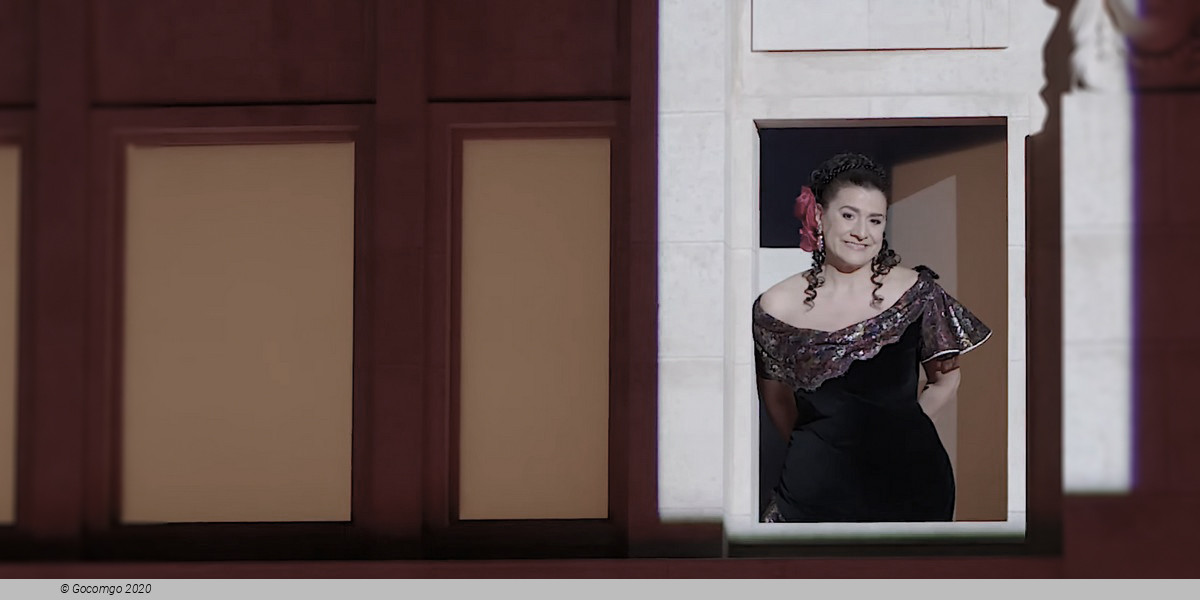About
The Salzburg Festival Whitsun took place from 3 to 6 June 2022. In 2022 in Salzburg was conjured up a vivid fantasy of Seville, with its stunningly bright light, its blistering heat, its intoxicating orange blossom scent, its unique melting pot of proud ancient cultures — and of course the incredibly varied music it generated and inspired.

The 2022 Salzburg Whitsun Festival ended with an overwhelming audience response, having taken place for the first time since 2019 with unrestricted seating capacities and 98 percent of seats occupied. The eleventh Festival under the artistic leadership of Cecilia Bartoli took the audience on a journey to Seville, a place that has long symbolized yearning and inspiration for her.
More than 10.400 guests attended the 2022 Salzburg Whitsun Festival. The highest numbers of visitors came from Austria, Germany, Switzerland, France, Italy, Great Britain and the US.

The Festival opened with the acclaimed new production of Gioachino Rossini’s Il barbiere di Siviglia, directed by Rolando Villazón in his Festival directing debut. He merged film scenes inspired by Woody Allen’s The Purple Rose of Cairo with the opera’s action, so that the fastpaced, witty staging was underpinned by video projections authentically recreated by rocafilm. The accuracy of every single punchline was reflected in the audience’s frenetic applause. Cecilia Bartoli as Rosina, Edgardo Rocha as Conte d’Almaviva, Nicola Alaimo (Figaro), Ilebrando D’Arcangelo (Basilio) and Alessandro Corbelli (Bartolo) were outstanding soloists. Les Musiciens du Prince – Monaco and the Philharmonia Choir under the baton of Gianluca Capuano received their well-deserved share of the enthusiastic ovations.

Javier Perianes offered a pianistic highlight, performing a matinée programme featuring excerpts from Isaac Albéniz’ four-volume anthology Iberia, from Manuel de Falla’s suite El amor brujo and Enrique Granados’ cycle Goyescas. The Iberian palette of sound colours inspired the audience to grateful ovations.

“La torre del oro”, Seville’s architectural landmark, was the symbolic inspiration of the programme presented by Christina Pluhar and her ensemble L’Arpeggiata, building bridges between the Old and the New Worlds on Saturday evening. From ground-breaking innovations of the 16th century to 20th-century compositions rooted in tradition, the exceptional concert offered a rich array of sounds.

Flamenco is often hailed as “the soul of Andalusia”. Maria Pagés is one of the great personalities on today’s flamenco scene, a master of all the classical and innovative variations on this genre. Together with alternating ensembles, she offered an impressive, passionate overview of different stylistic variants of consummate dance aesthetics.

The sacred concert on Whitsun Monday was dedicated to Cristóbal de Morales, one of the most important masters of the Spanish renaissance, and his famous student Francisco Guerrero. The vocal ensemble La Capella Reial de Catalunya and the instrumentalists of Hespèrion XXI also proved themselves masters of their art, offering a performance under Jordi Savall’s leadership that revealed even the most minute contrapuntal details with compelling transparency.

Closing this year’s Whitsun Festival, the gala concert “Carmencita & Friends” promises further vocal highlights. High-carat vocalists such as Cecilia Bartoli, Piotr Beczala, Rolando Villazón, Plácido Domingo, Nicola Alaimo, Ildebrando D’Arcangelo and John Osborn pay musical homage to the city of Seville. The orchestra Les Musiciens du Prince – Monaco, members of the Würth Philharmonic and the Philharmonia Choir from Vienna join their journey to Andalusia, conducted by Gianluca Capuano. Maria Pagés contributes choreographic colour.

The film series Reflexión, presented in cooperation with DAS KINO, found an enthusiastic audience of cineastes.
About the Salzburg Festival Whitsun
To hold the festival in Salzburg not only in the summer was offered by Hugo von Hofmannsthal, who together with max Reinhardt invented and first organized the Salzburg festival. According to his plan, the festival should be held annually not only in the summer, but also at Christmas time, Easter and during the Holy Trinity.

Since 1973, Herbert von Karajan has been organizing a short series of concerts during the Holy Trinity for season ticket holders for the Easter festival. They were called "Pfingstkonzerte" – "Concerts in the Holy Trinity." The first "Concerts" were dedicated to three symphonies by Anton Bruckner, which were performed for three evenings by the Berlin Philharmonic orchestra under the baton of Herbert von Karajan. From that time until 1982, the Berlin Philharmonic orchestra traditionally performed three orchestral concerts on Saturday, Sunday and Monday of the Holy Trinity.

After 1983 the orchestra took over and the other conductors (Georg Solti, Seiji Ozawa and Andre Previn). Since 1983, international orchestras – the Chicago Symphony Orchestra, the London Symphony orchestra and others-have taken part in the festival. Since 1998, the festival has been held under its current name-the Salzburg festival during the Holy Trinity, and Opera productions have also been added to the repertoire. Since the 1990s, the Salzburg Easter festival has given preference to the Baroque repertoire-for example, at the 2005 festival. Handel's Opera ACIS and Galatea and his oratory Solomon were performed. According to the established tradition at the festival, musicians play historical instruments.

From 2007 to 2013, the artistic Director of the Salzburg festival during the Holy Trinity was Riccardo Muti, who, wishing to show during the festival the link between Neapolitan and Austrian culture, held it under the motto "Salzburg to match Naples". During these five years, several rare operas of the Neapolitan Opera school were staged at the festival. Since 2014, the artistic Director of the Salzburg festival during the Holy Trinity is Cecilia Bartoli, who participates each year in an Opera production, which is first shown at the Salzburg festival during the Holy Trinity, and then repeated at the Salzburg summer festival. Thus, in 2012, she performed the role of Cleopatra in Handel's Opera Julius Caesar in Egypt, then played the main roles in Vincenzo Bellini's Norma (in 2013), Gioacchino Rossini's Cinderella (in 2014), and Gluck's Iphigenia in Taurida (in 2015).



